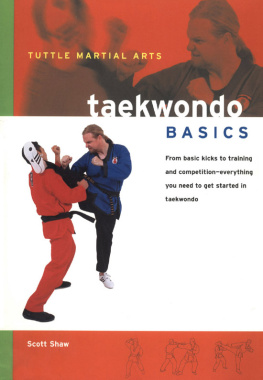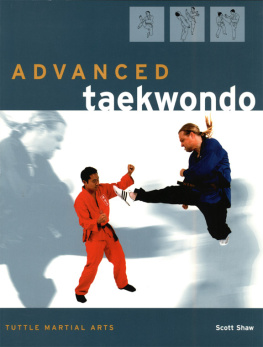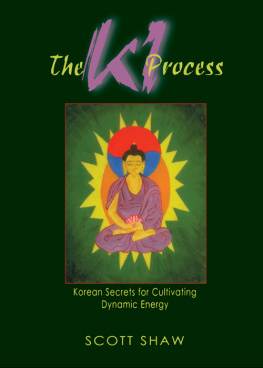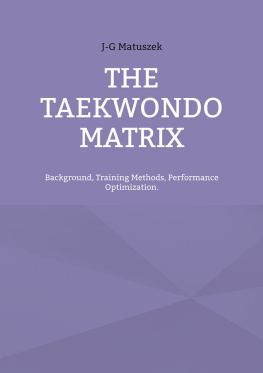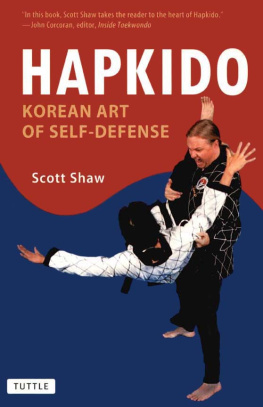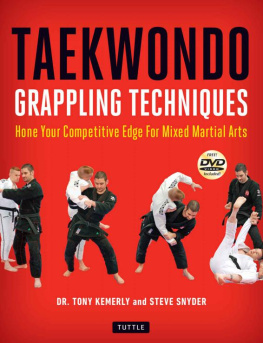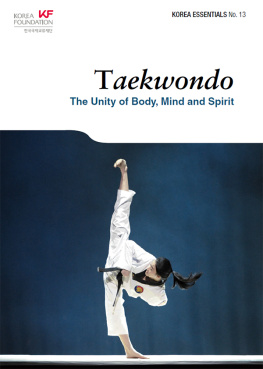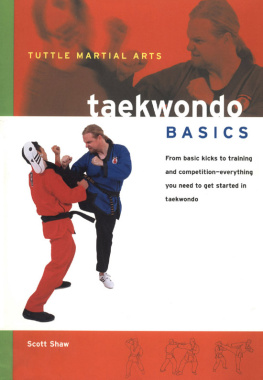Shaw Scott. - Taekwondo Basics
Here you can read online Shaw Scott. - Taekwondo Basics full text of the book (entire story) in english for free. Download pdf and epub, get meaning, cover and reviews about this ebook. genre: Science. Description of the work, (preface) as well as reviews are available. Best literature library LitArk.com created for fans of good reading and offers a wide selection of genres:
Romance novel
Science fiction
Adventure
Detective
Science
History
Home and family
Prose
Art
Politics
Computer
Non-fiction
Religion
Business
Children
Humor
Choose a favorite category and find really read worthwhile books. Enjoy immersion in the world of imagination, feel the emotions of the characters or learn something new for yourself, make an fascinating discovery.
- Book:Taekwondo Basics
- Author:
- Genre:
- Rating:5 / 5
- Favourites:Add to favourites
- Your mark:
- 100
- 1
- 2
- 3
- 4
- 5
Taekwondo Basics: summary, description and annotation
We offer to read an annotation, description, summary or preface (depends on what the author of the book "Taekwondo Basics" wrote himself). If you haven't found the necessary information about the book — write in the comments, we will try to find it.
Taekwondo Basics — read online for free the complete book (whole text) full work
Below is the text of the book, divided by pages. System saving the place of the last page read, allows you to conveniently read the book "Taekwondo Basics" online for free, without having to search again every time where you left off. Put a bookmark, and you can go to the page where you finished reading at any time.
Font size:
Interval:
Bookmark:

T HE FOUNDATIONS of taekwondo can be traced back thousands of years. Korea possesses a long and illustrious history of developing and refining advanced systems of martial arts. This history was idealized by the Hwa Rang warriors of the fifth century B.CThe "Flowering Youth," as they were known, brought an end to regional conflict, united the kingdoms on the Korean peninsula, and spread their understanding of Buddhism and warfare to the island nation of Japan. This historic transmission of knowledge helped to give birth to Japanese samurai culture. Although martial culture on the Korean peninsula dates back to the beginning of recorded time, the system of martial arts that came to be known as taekwondo is less than a century old.
The Birth of Taekwondo
At the beginning of the twentieth century, Korea was occupied by Japan. This annexation was not lifted until Japan's defeat at the end of World War II.
With brutal Japanese occupation lifted, Korea went through a period of rapid cultural revival. During this process, the native martial arts, which had been banned by the occupying forces, experienced a renewal. The Korean people, swearing never to be overtaken by a foreign power again, embraced this spread of the martial arts throughout their nation. From this came the birth of the modern Korean martial arts.
Taekwondo has gone through a long process of evolution since its foundations began to be laid at the end of World War II. It took many years for the various Korean martial arts instructors to finally unite their individual kwans, or "schools," under the banner of taekwondo. Ib understand this process, we can look at the history of the modern Korean martial arts.
The Kwans
The Chung Do Kwan
The Chung Do Kwan was founded by Lee Won Kuk. (In Korean names, the surname, or family name, comes first, followed by given names. Thus, in Western usage, Lee Won Kuk would be "Mr. Lee.") This was the first school of martial arts to be established in modern Korea and was the first school to begin laying the foundations for what was to become taekwondo.
Lee Won Kuk began his career in the martial arts in 1926, at the age of nineteen, when he moved to Japan to attend college. During his time at the university he studied Shotokan karate directly from its founder, Gichin Funakoshi.
Lee eventually returned to Korea and began teaching karate in September of 1944. His school was located at the Yong Shin School in Seoul.
During the Japanese occupation, it was virtually impossible for a Korean to open a school of karate in his homeland. Due to Lee's close relationship with the Japanese governor general of Korea, however, he was one of the very few people who were allowed to do so. This led to widespread rumors and deep distrust of Lee. It was believed that he must be a Japanese sympathizer, or he would not have been allowed to open his school. This distrust ran so deep that in 1945, when Korea was liberated, Lee was put on trial for his Japanese affiliations and had to temporarily close the doors of his school.

Lee was not convicted, however. Upon his acquittal, he became very proactive in his stance about Korean independence.
Lee formed a tight alliance with the Korean National Police. So much so, that when his Chung Do Kwan was reopened in Seoul, in April of 1946, it became known as the National Police Dojang.


In 1951, due to his age, Lee Won Kuk asked one of his senior students, Son Duk Sung to take over as the chief instructor of the studio. Son Duk Sung accepted this offer and thereby became the second grandmaster of the Chung Do Kwan.
Many of the Korean schools of martial arts closed their doors during the Korean War, and the Chung Do Kwan was no exception. It did not reopen until 1953. By this point, however, Lee Won Kuk rarely visited the school because of his advanced age. Son Duk Sung and the instructors Son had personally trained became the primary teachers of the kwan. As time progressed, several advanced students of the Chung Do Kwan branched off and founded their own kwans.
The Chosun Yun Moo KwanJi Do Kwan
The evolution of chosun yun moo kwan began in 1931 when Lee Kyung Suk, a Korean who taught judo, was allowed to establish the Chosun Yun Moo Kwan school in Seoul. He successfully operated this school of judo for several decades.
At the end of World War II, Lee Kyung Suk asked Chun Sang Sup to set up a course of kwon bop at his school. This program was named Chosun Yun Moo Kwan Kwon Bup Bu.
Chun Sang Sup began his martial arts training in judo while in high school. He then moved to Japan to attend Dong Yang Chuck Sik College. It was during this period that he was exposed to Shotokan karate, and he is believed to have earned a black belt.
Upon returning to Korea, Chun is believed to have secretly taught Shotokan karate to private students, beginning in approximately 1940. Because privately teaching karate was outlawed by the Japanese occupying forces, his teaching was not formally recorded until he established his training method after World War II.


Chun Sang Sup enlisted the help of Yoon Byung In to teach karate at the Chosun Yun Moo Kwan. Yoon was a fourth-degree black belt in Shotokan karate.
Yoon Byung In taught at the Chosun Yun Moo Kwan for approximately one year before breaking away and forming his own school, known as the Chang Moo Kwan. Chun Sang Sup again returned to full-time teaching responsibilities.
Chun's instruction continued until an evil twist of fate found him kidnapped and imprisoned by the North Korean military during the Korean War. He was never heard from again and was eventually believed to be dead.
Upon the loss of Chun, Chosun Yun Moo Kwan Kwon Bup Bu teaching passed to the hands of Yoon Kwe Byung, one of Chun's senior students. He renamed the school Ji Do Kwan, "Wisdom Way School."

During the 1950s, when the various kwans of the Korean martial arts began attempting to merge under one banner, Yoon Kwe Byung was against unification. Yoon wanted the Ji Do Kwan to remain free from organizational control, but the other senior members of the Ji Do Kwan disagreed. As a result, Yoon was ousted from his presidency, and Lee Chong Woo was elected the new president of the Ji Do Kwan.
Lee Chong Woo forged the Ji Do Kwan into one of the leading schools of martial arts in modern Korea. Its practitioners were noted for their consecutive wins at South Korean tournaments. Lee also went on to hold several pivotal positions within the Korea Taekwondo Association and the World Taekwondo Federation.

Font size:
Interval:
Bookmark:
Similar books «Taekwondo Basics»
Look at similar books to Taekwondo Basics. We have selected literature similar in name and meaning in the hope of providing readers with more options to find new, interesting, not yet read works.
Discussion, reviews of the book Taekwondo Basics and just readers' own opinions. Leave your comments, write what you think about the work, its meaning or the main characters. Specify what exactly you liked and what you didn't like, and why you think so.

